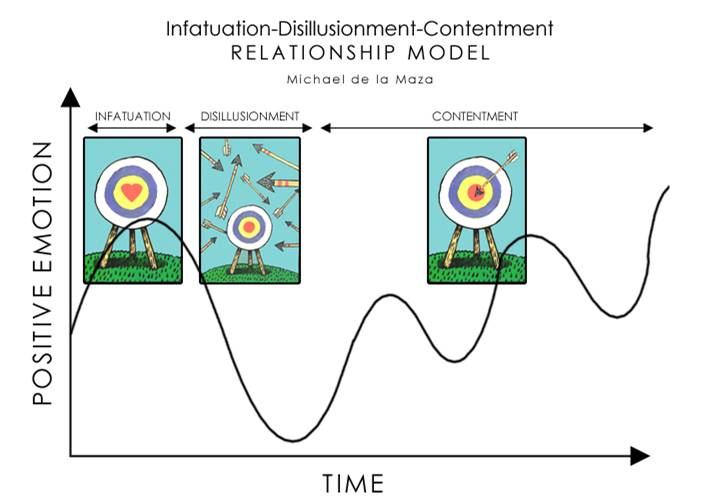IDC
elzeldomba Infatuation, Disillusionment, and Contentment: Understanding the Adoption of One Laptop per Child
Michael de la Maza 16:30, 21 August 2006 (EDT)
The Infatuation, Disillusionment, and Contentment (IDC) relationship model describes the progress of romantic relationships and is helpful in understanding how the OLPC may be adopted by countries and communities.
The IDC model suggests that a romantic relationship proceed through three phases:
1. Infatuation: A period characterized by extremely high emotional intensity.
2. Disillusionment: A period of bickering, irritation, and sometimes unfathomable sadness.
3. Contentment: An extended period of increasing happiness.
Successful relationships proceed from infatuation to disillusionment to contentment while unsuccessful relationships end during the disillusionment stage. People between the ages of 21 and 60 have found the IDC framework helpful in understanding their relationships.
Although I developed the IDC model to describe physically intimate romantic relationships, I have found it useful in understanding many other phenomena:
⢠The amount of email traffic between two people who just met at a cocktail party.
⢠The political fortunes of third party candidates.
⢠My interest in playing with a new gadget.
I expect IDC to characterize the adoption of OLPC on at least two levels. On a macro level, it will describe how countries purchase the OLPC and how they feel about how the OLPC is helping their citizens. On a micro level, it will describe how communities value the OLPC.
At the macro level we have already seen infatuation â many countries have expressed an interest in OLPC at the level of Ministry of Education or higher â followed by a small measure of disillusionment â Indiaâs rejection of the OLPC. In a romantic relationship disillusionment is often characterized by boundary-setting argument and harmful competition between two partners. Countries are in the process of identifying what boundaries might be violated by OLPC and render it unacceptable. This careful analysis follows the infatuation phase and countries are just beginning to apply the rigor necessary to make a positive decision about the OLPC.
At the micro level I expect that the initial enthusiasm for OLPC will be driven by its claims about improving education. But when OLPC fails to immediately produce a generation of Shakespeares and Fermis it will be criticized for failing to deliver on its promises. Contentment will occur when communities realize the many other benefits of the OLPC and, in particular, understand how it drives the creation of social structure via communication.
In my work I have found that one of the great benefits of making the IDC model explicit is that couples who are in the infatuation phase can emotionally and psychologically prepare for disillusionment. OLPC enthusiasts, like me, should likewise be prepared for a wave of diillusionment that will almost inevitably follow the current infatuation with the OLPC.
